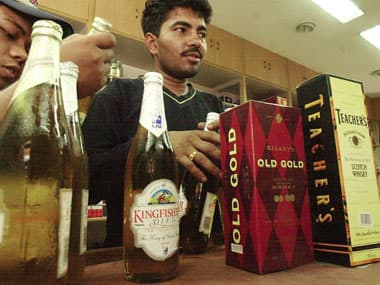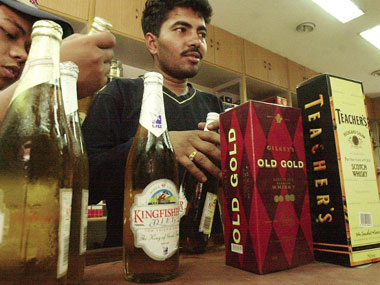New Delhi: What makes the world’s largest democracy go around? Well, booze among more serious things. Ideology, leadership and ideas maybe the driving force of politics at the top, but on the ground one of the motivators is alcohol. It makes party foot soldiers work harder and serves as bribe to voters. There is no proof that it influences voting but polls being a serious matter, no party wants to take a chance. Alcohol distribution, particularly in the slums, used to be an open affair not many years ago. Alcohol used to be purchased in bulk and distributed door to door. Then the Election Commission decided to intervene. It put strict checks on transport of liquor during elections. It is no more possible for party workers to directly deliver the goods to target groups. But that has not stopped the practice. The distribution network has become more sophisticated to avoid the EC’s hawk eye. [caption id=“attachment_2051833” align=“alignleft” width=“380”]
 Representational image. AFP image[/caption] About 43,000 bottles of liquor packed in different units and Rs 1.57 crore in cash were seized during election season in Delhi last year. The seizure, made jointly by the Delhi Election Commission and the Delhi Police included 1,642.22 litres of country-made liquor, 758.7 litre of Indian-made foreign liquor and 585 bottles of beer. These seizures were made across the city in areas like Sarai Rohilla, Okhla, Narela, Anand Vihar, Burari and Hari Nagar. However, sources in the police say an equal amount or more of liquor might have slipped through. Posing as an agent of a political party, this Firstpost reporter visited 10 liquor shops at different locations to know how liquor is procured in large quantities despite strict vigilance. While some refused to strike a deal saying that they have electronic monitoring of transactions and their shops are under round-the-clock CCTV surveillance, others agreed to book the order and explained the process of procurement and mode of payment. “The safest way is to make full payment for the liquor you want against cash. Both of us will have a record of the numbers of a few currency notes. Give the voter a slip with the number of a currency note which he will deposit to get the bottles. Make sure that these slips are distributed with due secrecy,” said a liquor vendor at Community Centre of New Friends Colony. Explaining other ways as well, he said, “Submit your specimen signature with me. Give the voter a token with the same signature. It will be exchanged for liquor.” If you want to buy liquor in bulk, which is not allowed, there is also a solution to the problem. “Park your car somewhere near my shop. Instead of two or three cartons, you can fill your vehicle with bottles by taking three at a time to each person with you,” said another vendor at Bharat Nagar. Interestingly, big liquor shops generally do not sell in bulk and fail to make profit. “Illegal traders gain a lot. CCTV cameras have been installed and I am required to submit daily reports to the government officials concerned. Once I reach the daily quota, I close my shop to avoid getting a notice against bulk sale,” a vendor explained. In some cases, liquor bottles are supplied to makeshift electoral camps, eateries and youth and sports clubs to woo youth voters, another vendor revealed. But, the effort to lure voters with liquor does not work anymore, feel party workers at the ground level. “Earlier people would vote after taking liquor and cash but now they don’t vote even after accepting such goodies,” said an election agent.
Representational image. AFP image[/caption] About 43,000 bottles of liquor packed in different units and Rs 1.57 crore in cash were seized during election season in Delhi last year. The seizure, made jointly by the Delhi Election Commission and the Delhi Police included 1,642.22 litres of country-made liquor, 758.7 litre of Indian-made foreign liquor and 585 bottles of beer. These seizures were made across the city in areas like Sarai Rohilla, Okhla, Narela, Anand Vihar, Burari and Hari Nagar. However, sources in the police say an equal amount or more of liquor might have slipped through. Posing as an agent of a political party, this Firstpost reporter visited 10 liquor shops at different locations to know how liquor is procured in large quantities despite strict vigilance. While some refused to strike a deal saying that they have electronic monitoring of transactions and their shops are under round-the-clock CCTV surveillance, others agreed to book the order and explained the process of procurement and mode of payment. “The safest way is to make full payment for the liquor you want against cash. Both of us will have a record of the numbers of a few currency notes. Give the voter a slip with the number of a currency note which he will deposit to get the bottles. Make sure that these slips are distributed with due secrecy,” said a liquor vendor at Community Centre of New Friends Colony. Explaining other ways as well, he said, “Submit your specimen signature with me. Give the voter a token with the same signature. It will be exchanged for liquor.” If you want to buy liquor in bulk, which is not allowed, there is also a solution to the problem. “Park your car somewhere near my shop. Instead of two or three cartons, you can fill your vehicle with bottles by taking three at a time to each person with you,” said another vendor at Bharat Nagar. Interestingly, big liquor shops generally do not sell in bulk and fail to make profit. “Illegal traders gain a lot. CCTV cameras have been installed and I am required to submit daily reports to the government officials concerned. Once I reach the daily quota, I close my shop to avoid getting a notice against bulk sale,” a vendor explained. In some cases, liquor bottles are supplied to makeshift electoral camps, eateries and youth and sports clubs to woo youth voters, another vendor revealed. But, the effort to lure voters with liquor does not work anymore, feel party workers at the ground level. “Earlier people would vote after taking liquor and cash but now they don’t vote even after accepting such goodies,” said an election agent.
As Delhi polls draw closer, supplying booze to voters gets more complex
Tarique Anwar
• January 18, 2015, 11:25:16 IST
Alcohol distribution, particularly in the slums, used to be an open affair not many years ago.
Advertisement
)
End of Article